PHUKET: The Royal Thai Navy is bringing Thailand's reputation into disrepute by suing two Phuketwan journalists using a law that was meant to control computer hackers.
But far worse treatment is being meted out to journalists across the border in Burma and in Egypt, where Australian Peter Greste has just completed 100 days in jail.
In Burma, as the New York-based Committee to Protect Journalists reported this week, one reporter has just been sentenced to a year in jail for ''disturbing a civil servant.''
Most people would see it as the role of journalists to disturb civil servants. Sadly, journalists are always a target in parts of the world where narrow-minded people attempt to impose their will.
Some, like AP photographer Anja Niedringhaus, 48, who was shot dead at the weekend in Afghanistan, pay the ultimate price.
Phuketwan aims to highlight its own case and other unjust cases around the world where journalists are punished for merely doing their jobs.
It's all part of the 30-day countdown to the 30th anniversary of World Media Freedom Day on May 3.
Here's what the Committee to Protect Journalists had to say about Burma plus the latest on Peter Greste:
A BURMESE journalist was sentenced to one year in prison on Monday on charges of ''trespassing'' and ''disturbing an on-duty civil servant'' while reporting a news story, according to local reports.
The Committee to Protect Journalists calls for the verdict to be overturned on appeal.
A court in the country's central Magwe region convicted Zaw Pe, a reporter with the Democratic Voice of Burma (DVB), of violating criminal codes in August 2012 while reporting on scholarships awarded to Burmese students by a Japanese foundation, according to news reports.
A Magwe Township Education Department official who was unnamed in news reports filed the charges against Zaw Pe and the father of a student who had made inquiries about the educational grants.
When the charges were first filed, police interrogated Zaw Pe, who is also known as Thura Thet Tin, for more than eight hours and confiscated his video camera, memory card, and press badge, according to a DVB report. He was released while the criminal charges were pending, according to reports.
Thein Tun, Zaw Pe's lawyer, said he would simultaneously serve one-year terms for each charge, according to the reports. Zaw Pe will appeal the verdict, according to news reports citing his lawyer.
Burmese officials have increasingly used the threat of criminal trespassing charges to prevent probing reports into their activities, DVB editors told CPJ during a research mission in 2013.
Previously run from outside the country but now with a bureau inside Burma, DVB was frequently targeted for harassment by the previous military government for its critical reports.
''Today's conviction of journalist Zaw Pe is the latest indication that Burma's once-promising democratic reform program is rapidly being reversed,'' said Shawn Crispin, CPJ's senior Southeast Asia representative.
''With at least five journalists now in jail, President Thein Sein's vows to uphold press freedom ring increasingly hollow. We call for the immediate release of all reporters being held in Burma.''
Zaw Pe's conviction comes amid a widening clampdown on the press. In December,Burmese journalist Ma Khine was sentenced to three months in prison on charges of defamation, trespassing, and allegedly using abusive language while interviewing a lawyer about a legal dispute in eastern Kayah State.
She was the first Burmese reporter to be imprisoned since Thein Sein released 14 jailed journalists in a 2012 presidential pardon of political prisoners.
Andrew Leahy, public diplomacy officer at the US Embassy in Rangoon, told DVB on Monday that ''the sentence given to Zaw Pe sends the wrong message to the international community and local journalists on the Union Government's commitment to sustaining freedom of expression and to political reform.''
A British Embassy spokesperson said, ''We are concerned by the jailing this week of DVB reporter Zaw Pe in Magway [Magwe]. Media freedoms are an essential element of democracy, and it is important that they are protected.''
David Mathieson, senior researcher on Burma for Human Rights Watch, said, ''Zaw Pe's sentencing is another reprehensible example of the government's recidivism on press freedoms, pulling out military era provisions to intimidate the media.
''Unfortunately the national level parliament is failing to repeal these petty provisions utilised by capricious local officials and is instead drafting laws that will intimidate the press and curtail their ability to investigate corruption and malfeasance.''
DVB Multimedia Group released a statement denouncing the sentencing.
''DVB is confident that reporter Zaw Pe (a.k.a. Thura Thet Tin) was fulfilling his responsibility as a news reporter to inquire about a scholarship program at the Magwe Township Education Department, which was in the public interest,'' the statement read, ''and therefore completely denounce his sentencing.
''Despite all the government officials' pledges of press reform, we believe the jailing of Zaw Pe is an obstacle to media freedom in the country, and we call for the unconditional release of the reporter and his co-defendant,'' the DVB statement read.
Last month, the trial began of four journalists and the CEO of Unity Weekly journal, charged with violating the State Secrets Act. The Unity staffers were charged after reporting in January about a factory allegedly concealing chemical weapons in Magwe's Pauk Township.
IN AUSTRALIA, the ABC reports, the mother of Australian journalist Peter Greste has expressed disbelief that her son has now been detained in Egypt for 100 days.
Greste and two of his Al Jazeera colleagues were arrested in Cairo in December and have been in the city's Tora military jail ever since, sharing a small cell with primitive facilities.
The trio, accused of spreading false news and having links with the Muslim Brotherhood - blacklisted as a terrorist organisation - will return to court on April 10.
Greste's mother Lois has told the ABC's PM the family never believed he would be held for so long.
''We never believed at the start of this that it would reach this point. We thought it would be over, and sometimes I've thought perhaps even a day,'' he said.
''And then when two, three, four, and now it's 100 days. And it's really hard, it's really hard.
''Sometimes we have good days and we cope reasonably well, and other days it's extremely difficult and one of us falls in a heap.
''Fortunately one of us seems to maintain some equilibrium and the other one falls in a heap and it goes the other way at other times.''
Greste and colleagues Mohamed Fahmy and Baher Mohamed have constantly denied the charges, which Al Jazeera has labelled absurd.
Ms Greste says she has pride in the way her son is coping with the trial.
''That also bolsters us because he's still managing to hold on . . . he's doing well. And (Greste's brother) Mike tells us that he's coping and he's fine,'' she said.
She says the family is trying to ''keep everything on a fairly cool level'' ahead of Greste's court appearance on Thursday.
''Our hearts are getting excited and sort of hoping like mad, but both our heads are trying to clamp ourselves down so that we don't come a big cropper,'' she said.
Navy Uses Computer Crimes Act to Sue:
http://phuketwan.com/tourism/navy-captain-uses-computer-crimes-act-sue-journalists-criminal-defamation-19413//
The Nation Cartoon in Full:
http://www.nationmultimedia.com/specials/nationphoto/show.php?id=30&pid=16667/
Phuket Reporters Prepared for Prison:
http://www.bangkokpost.com/news/local/387125/reporters-prepared-for-prison-in-navy-defamation-lawsuit/

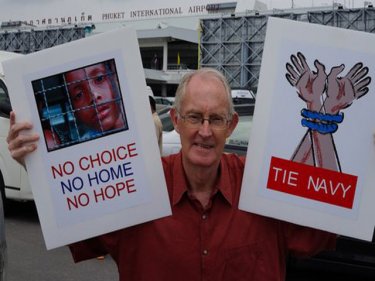
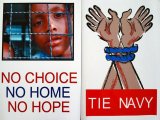
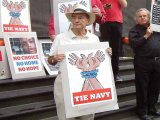


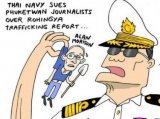



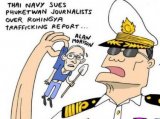
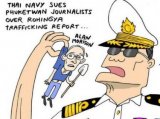
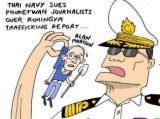

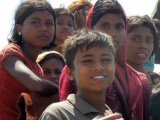




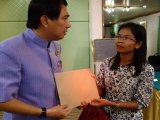
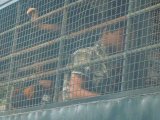
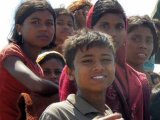

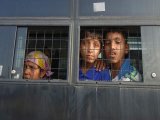
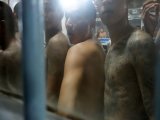
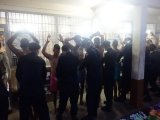


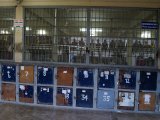
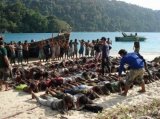




There's some phone hacking journalists in England I'd like to see behind bars.
While the messengers are frequently the victim of injustices around the planet, journos are not above the law.
Posted by tt on April 9, 2014 12:12
Editor Comment:
Nobody said journalists are above the law, tt, but these Thai laws are particularly bad laws, being used to stop journalists doing their jobs. The phone hacking cases are before the courts and likely to prove your point. But to confuse good prosecutions with bad prosecutions would be foolish.